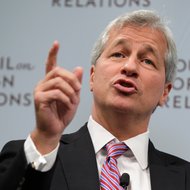 Yuri Gripas/ReutersJamie Dimon, the chief of JPMorgan Chase.
Yuri Gripas/ReutersJamie Dimon, the chief of JPMorgan Chase.
Finally moving beyond a trading debacle that has stained his once-stellar reputation, Jamie Dimon, JPMorgan Chase’s chief executive, on Friday trumpeted a strong quarter of earnings stemming from a surge in mortgage lending.
Mr. Dimon has been fighting to shift attention from a multibillion-dollar trading loss in May that rattled investors, prompted the bank to claw back millions in compensation and attracted the scrutiny of federal law enforcement agents. The latest quarter’s profit, up 34 percent, to $5.71 billion, helped do that.
Mr. Dimon, who months ago took a swaggering tone in dismissing the troubled bets and was later forced to be more contrite, struck his usual confident tone on Friday. He emphasized that JPMorgan had contained the fallout from the bungled trade, after closing out the position and limiting the losses to the investment bank of on the remainder of the credit derivative trade. The losses on the bet were $449 million in the third quarter, bringing the total loss to $6.25 billion for the year.
Related Links
 Documents: The press release
Documents: The press release Graphic: Earnings Calendar
Graphic: Earnings Calendar- Earnings at Wells Fargo Jump 22%
- Boom in Mortgages Is Expected to Raise Banks’ Profits (Oct. 11, 2012)
“Synthetic credit is a sideshow,” Mr. Dimon said.
Instead, he pointed to the bank’s robust growth across its business units, especially in its mortgage banking unit, which reported a profit increase of 57 percent from a year earlier.
“We believe the housing market has turned the corner,” Mr. Dimon said.
Over all, the company’s earnings, at $1.40 a share, surpassed Wall Street’s estimates. Revenue in the third quarter was $25.9 billion, up 6 percent from the year-ago quarter.
As the nation’s largest bank in assets, JPMorgan’s performance, especially when rosy, is seized upon as a positive sign for the overall economy. The growth at JPMorgan, particularly in loans to consumers and businesses, could signal broader optimism among Americans and bode well for the housing markets, which have been lurching toward recovery.
“It’s a distinctly positive sign,” said Glenn Schorr, an analyst with Nomura Securities.
The bank also reported that fewer consumers were behind on their credit card bills. Write-offs of soured card loans fell to 3.6 percent, from 4.7 percent the previous year. Those trends echo a pattern across the United States.
In August, delinquencies on credit cards stood at 2.32 percent, according to Moody’s Investors Service. That’s down from 3.04 a year earlier.
Still, investors in bank stocks remained wary after the earnings announcements of JPMorgan and Wells Fargo on Friday. Shares of JPMorgan declined 48 cents, or 1.14 percent, to $41.62. Investors were spooked, in part, by shrinking net interest margins, which is the profit margin achieved from lending and investing. JPMorgan’s net interest margin, for example, dipped to 2.43 percent from 2.66 a year earlier.
At JPMorgan, a glut of deposits is challenging because of persistently low interest rates, which make yields on the bank’s investments anemic.
JPMorgan’s earnings were buoyed, though, by an increase in mortgage lending, spurred, in part, by exceedingly low interest rates, driven even lower in recent weeks by the Federal Reserve’s mortgage bond buying program. New home loans and refinancings at the bank hit $47 billion, up 29 percent from the period a year earlier.
Mr. Dimon tempered his expectations for the market and noted that a large swath of the new originations came from a burst of refinancing activity that would eventually slow down. Refinancings accounted for roughly 75 percent of the quarter’s mortgage volume.
He warned, too, that defaults could continue, along with foreclosures, which would most likely leave the bank to shoulder higher costs.
Hitting a familiar tone, Mr. Dimon also remarked that the housing market could rebound more quickly if lawmakers in Washington did less meddling. “I would hope for America’s sake we start to fix the things that make the mortgage underwriting too tight,” he said on a conference call with reporters.
Throughout its core lending businesses, JPMorgan showed signs of strength. The commercial banking group reported record revenue. The volume of credit card sales jumped 11 percent over the previous year, bolstering the broader unit. The card services and auto business posted profits of $954 million, up 12 percent.
With the improving credit environment, JPMorgan set aside less money to cover potential losses, increasing its profits. In the mortgage banking business, the bank cut the amount of reserves by $900 million. Across the bank, JPMorgan set aside $1.79 billion of such funds, compared with $2.41 billion a year earlier.
Revenue from fixed-income and equity markets remained largely stagnant.
Still, the bank is dogged by investigations that could increase its headaches going forward. In the latest challenge for the bank, federal authorities are building criminal cases related to the trading loss, examining calls in which JPMorgan employees talked about how to value the bets. The Securities and Exchange Commission is also investigating the trading losses.
In addition, JPMorgan is facing a lawsuit against Bear Stearns, the troubled unit it now owns. Earlier this month in its first move against a big bank, the federal mortgage task force, co-headed by the New York attorney general, Eric T. Schneiderman, sued Bear Stearns and its lending unit, claiming it defrauded investors who bought mortgage securities during the housing boom.
In a bid to clean up the bungled trade ahead of its third-quarter earnings, JPMorgan has broadly reshuffled its top executive ranks. For example, Douglas L. Braunstein, the bank’s chief financial officer since 2010, is expected to give up his position, but remain at the company. Earlier, Barry Zubrow, who currently heads the bank’s regulatory affairs, announced he would resign by the end of the year.
In the second quarter, the bank transferred the remaining credit bets in the chief investment office to its investment banking unit. On Friday, JPMorgan said it “effectively closed” out its derivative position, which was made by Bruno Iksil, the so-called London Whale.
Article source: http://dealbook.nytimes.com/2012/10/12/jpmorgan-quarterly-profit-rises-34/?partner=rss&emc=rss

